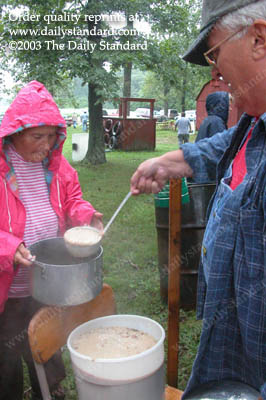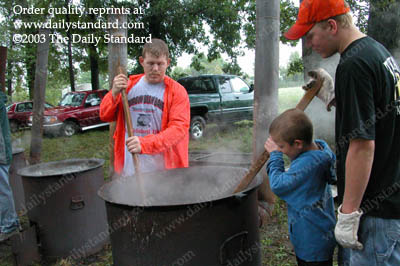By SHELLEY GRIESHOP
sgrieshop@dailystandard.com
 Stepping with caution through the slippery mud, carrying umbrellas
and food containers of all sizes, they came to the annual Durbin
Bean Bake for one reason and one reason only: The beans.
Stepping with caution through the slippery mud, carrying umbrellas
and food containers of all sizes, they came to the annual Durbin
Bean Bake for one reason and one reason only: The beans.
Clutching an old tin bowl, Paul Howell stood in the pouring
rain watching workers take ladel after ladel of bean soup from
the nine, steaming kettles. When the work was complete, the
famed bean soup filled 55 five-gallon lard containers.
“I imagine the beans will be a little more watered-down
this year,” Howell said with a grin.
Now in his late 80s, Howell hasn’t missed too many Durbin
Bean Bakes since his childhood when he lived just over a mile
down the road. He doesn’t live in the area anymore, but
despite his age, he made the trip once again to the woods along
Erastus-Durbin Road where memories were made, he said.
“My grandmother, and even her parents, came out here and
that was back in the Civil War days,” boasted Howell,
as he and his son-in-law joined others in line to fill their
containers.
Monday marked the 105th annual Durbin Bean Bake held in a five-acre
woods now owned by the Durbin Bean Bake Community Club.
“We’re just like the postman — even a drenching
rain won’t stop the bean bake,” said Larry Fennig,
60, of Celina, vice president of the club and “head bean
cooker.”
In a bright yellow raincoat, Fennig hurriedly made his way around
the muddied ground where the 25-gallon kettles now stood empty
of soup but filled with boiling water.
“You have to put hot water back in them right away so
they don’t bust,” Fennig explained as his twin brother,
Barry Fennig, began cleaning the fire-heated pots.
The 10 cast-iron kettles (one is exclusively filled with hot
water for cleaning) are as old as the bean bake celebration
itself, although their outer jackets have been replaced over
the years, Larry Fennig said.
The rich history that surrounds the annual food-fest, complete
with homemade pies and other goodies, is as important to those
who come as the Northern Navy beans.
It all began when Civil War veteran and former camp cook, Andrew
Jackson Snavely, sought a reunion with his war buddies back
in the late 1800s. He longed for another chance to fix beans,
hardtack and sowbelly for his fellow soldiers, according to
historians.
First named the Bean Supper and later The Durbin Soldier’s
Bean Supper Association, the first bean bake was held on Labor
Day in 1898. Mount Carmel Church officials and the local American
Legion post took turns handling the event prior to handing it
over to the community club.
In 1907, the committee noted expenses for the meal: 61 pounds
of meat @ 15 cents per pound, four bushels of beans @ $7.33
and five bushels of crackers @ $15.54.
“This year we bought about 400 pounds of beans and 120
pounds of ham and bacon,” Fennig said, at a price much
higher than 100 years ago, he added.
Freewill donations are given for the soup and the non-profit
committee proudly dispenses all proceeds to charities within
Mercer County. Funds in the past have purchased toys for young
patients at Community Hospital in Coldwater, teddy bears for
youngsters transported by the county’s emergency medical
service (EMS) and helped support work at St. Peters Neurological
Center.

The Labor Day event begins a month in advance when area senior
citizens begin cleaning the store-bought beans, Fennig explained.
On Monday, the ham and bacon started cooking about 12:30 p.m.
Beans and salt and pepper were added at 1:30, followed by crackers
for thickness. With added water — including moisture from
the heavens — the mixture filled each kettle 3⁄4
full. By 3:20 p.m. “it was soup.”
This year, new county commissioner Jim Zehringer helped stir
the kettles with the traditional four-inch wooden paddles. He
also may have invented a new festival activity, Fennig said
laughing.
“He was walking across the park when his upper body got
going faster than his feet and he tripped up in the mud. He
may have set a new belly sliding record,” Fennig said
with a grin.
After receiving several inches of rain throughout the weekend,
some of the annual traditions were regrettably broken. Only
a few of the day’s activities such as musical entertainment
and games went on as planned. Also missing from the rain-soaked
event were picnic tables of family reunions that traditionally
mark the end of the summer.
Instead of the normal crowd of thousands, only hundreds arrived
to retrieve beans before heading home to drier ground. Still,
only two of the 55 containers remained filled after 6 p.m.,
Fennig said.
“I don’t know if we’ll make a profit this
year or not, but we want to thank those who came out despite
the rain,” said Fennig. “It always can be worse.
At least it wasn’t too hot.”
|

